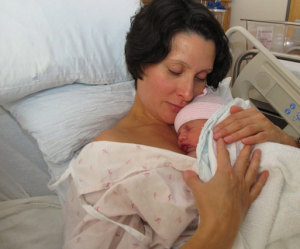Submitted by: Emily C. Taylor, MPC, IHI-IA, LCCE, CD(DONA)
Founder and Director of WISE (Women-Inspired Systems’ Enrichment)
 According to the Oxford English Dictionary, normal means “Serving to establish a standard. Of natural occurrence. The usual, typical or expected state or condition.” Rarely does this definition apply as precisely as it does to breastfeeding. Let’s break that definition down: 1) it is, indeed, the standard by which all other methods of feeding a human infant are judged. (Can’t you hear the formula ads proudly proclaiming, “Our closest even to breastmilk!”?) 2) Much like other natural occurrences, even the 93 chemical elements, breastfeeding is at its finest without artificial aid. And, 3) the flow of milk from mother to child can safely be expected to transpire.
According to the Oxford English Dictionary, normal means “Serving to establish a standard. Of natural occurrence. The usual, typical or expected state or condition.” Rarely does this definition apply as precisely as it does to breastfeeding. Let’s break that definition down: 1) it is, indeed, the standard by which all other methods of feeding a human infant are judged. (Can’t you hear the formula ads proudly proclaiming, “Our closest even to breastmilk!”?) 2) Much like other natural occurrences, even the 93 chemical elements, breastfeeding is at its finest without artificial aid. And, 3) the flow of milk from mother to child can safely be expected to transpire.
When then, if breastfeeding is so normal, do we insist on asking women “Do you plan to breastfeed?” And, why, do so many women respond, “I’d like to try?” As a doula, a childbirth educator, a Baby-Friendly Hospital expert, and as a woman, I’m sad to say it’s because well-intended “supporters” among us treat breastfeeding as if it is the exception. Therefore, it is up to us to protect the normal until this paradigm shifts. Here are three suggestions for mothers, birth workers, or anyone who wishes to don their super-heroes cape and protect the normal:
1) Be smarter than the advertising. Better yet, avoid it altogether… Denounce it! In a recent study I published with my esteemed colleagues, we found that women’s confidence in their ability to breastfeed decreased remarkably after viewing a few common advertisements. Before reviewing the ads, women decreed that mothers’ milk was best; after the ads, they wondered whether their own milk would meet their babies’ ever-changing needs. I don’t care how beneficent these advertisements appear: They serve their purpose of getting women to use the products.
So, what can you do? Ask your local hospitals and providers if they are compliant with the International Code of Marketing of Breastmilk Substitutes. If so, they refrain from distributing formula company advertising. If not, ask them to do so. (Hospitals can register with www.banthebags.org to show their solidarity with the thousands of other hospitals who have signed on. (Massachusetts and Rhode Island are bag-free states!) If they won’t do it, tell everyone you know to leave those bags (or “educational materials” or coupons) behind.
2) Go “Baby-Friendly”! The Baby-Friendly Hospital Initiative is designed to give mothers and babies the optimal environment in which to start breastfeeding. Staff is trained to provide evidence-based support on infant feeding, mothers are encouraged to hold their babies skin-to-skin, and to room-in continuously. Only 6% of hospitals in the US are designated as Baby-Friendly. But, you can make your own “Baby-Friendly” by requesting the practices for yourself and those you are serving. Set the expectation: “The baby will be going skin-to-skin immediately after birth, and will stay there through at least the first feed.” “The baby and mother will be rooming-in so they have an opportunity to practice baby-led feeding, and get to know each other with the support of the hospital staff.” And, of course, stay close if you’re at home or a birth center, too!
3) Learn about how the Affordable Care Act protects working mothers’ rights to breastfeed. The ACA amends the Fair Labor Standards Act to require break time and a private place for hourly workers to nurse or express milk. Employers sometimes need a bit of guidance about their role in protecting the normal. Mothers and birth workers can (educate themselves and) point employers to the Division of Labor and the Office on Women’s Health. A house bill called “Supporting Working Moms Act” is currently before the House of Representatives. It seeks to expand ACA’s requirements to all employers. Track S.934 so that you are ready to support it when its day arrives.
Above all, remind yourself that breastfeeding IS normal, and that like most things in this day and age, normal needs protecting.
Happy National Breastfeeding Month!
[Birth workers: If you would like to read more about protecting breastfeeding, check out our new book, Achieving Exclusive Breastfeeding: Translating Research into Action (Clinics in Human Lactation), by Labbok, Taylor or Parry, 2013.]Also, see what the Surgeon General has to say on the matter by reading her Call to Action to Support Breastfeeding.
 Emily C. Taylor, MPC, IHI-IA, LCCE, CD(DONA), Achieving Exclusive Breastfeeding: Translating Research into Action (Clinics in Human Lactation), by Labbok, Taylor or Parry, 2013 is also Founder and Director of WISE (Women-Inspired Systems’ Enrichment).
Emily C. Taylor, MPC, IHI-IA, LCCE, CD(DONA), Achieving Exclusive Breastfeeding: Translating Research into Action (Clinics in Human Lactation), by Labbok, Taylor or Parry, 2013 is also Founder and Director of WISE (Women-Inspired Systems’ Enrichment).

Good morning!
I’ve been trying to reach you for sometime. My hospital loves your handouts and forms. Can you please email me? We have a few question regarding branding and use of the forms.
Dear Angela,
I am so sorry I am only seeing your comment now it was lost in our spam filter… If you would still like to talk about ways we can support you and your hospital please email us at info@PainToPowerChildbirth.com Thank you